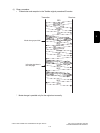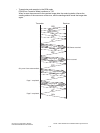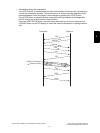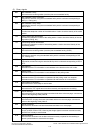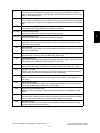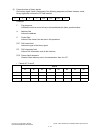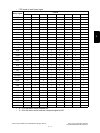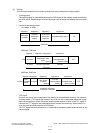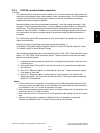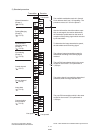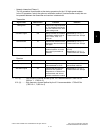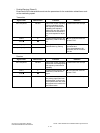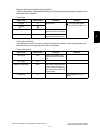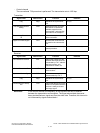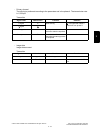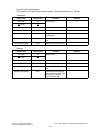
© 2003 - 2008 TOSHIBA TEC CORPORATION All rights reserved GD-1150/1151/1200/1201/1160/1260
DIALING/COMMUNICATION CONTROL
3 - 13
3
3.2.3 V.8/V.34 communication sequence
1) Outline
- V.8 is performed as a startup procedure to switch to V.34. V.8 can connect an existing facsimile
machine to the equipment using a data modem or other V-series modems. The V.34 modem has
a modem circuit previously recommended, allowing it to be also connected to the existing
modems while they are upper compatible.
- New technologies such as the pre-emphasis technology *1 and the probing technology *2 are
fully used. The pre-emphasis technology *1 not only speeds up the modulation, but also gains
the S/N ratio. The probing technology examines the line characteristics and optimizes the
modem for the line condition. Therefore, not only do these technologies speed up the transmis-
sion momentarily, but also the average speed of the process during the data transmission is
increased.
- For V.8 and the pre/post-FAX transmission for V.34, the procedure is speeded up by the full
duplex communication.
- Following 14 types of the image transmission speed are available: *3
33.6 kbps/31.2 kbps/28.8 kbps/26.4 kbps/24.0 kbps/21.6 kbps/19.2 kbps/16.8 kbps/14.4 kbps/
12.0 kbps/9.6 kbps/7.2 kbps/4.8 kbps/2.4 kbps
- The modulating speed (baud rate) *4 can be selected from 2,400, 3,000, 3,200 symbol/sec (man-
datory), or 2,743, 2,800, 3,429 symbol/sec (option). The data rate can be set more accurately
than the conventional modem.
Notes:
1. ECM is used in the V.34 procedure. If the setting for the ECM transmission/reception of the
user data is set to “Not performed”, the V.8 procedure is not performed and the procedure is
not switched to V.34. V.17 or lower is selected in this case.
2. When the transmission/reception speed is set to 14.4 kbps or slower, the V.8 procedure is not
performed, and V.17 or lower is selected.
3. See “Late start (P3-20)” to move to the V. 8/V.34 procedure after starting with the V.21 proce-
dure.
4. After the V.34 procedure is started, the fallback for the V.34 procedure is performed.
However, the fallback for the V.17 mode or lower mode is not performed.
*1
:
A signal is sent while raising the output level in the high-frequency band in which the noise
is relatively loud.
*2
:
Tone signal called “Probing Tone” is sent for the receiver to examine the line characteris-
tics of the line.
*3
:
In the ITU-T Recommendation, it is described as “data rate”. “Image transmission speed”
is the same as “data rate”.
*4
:
In the ITU-T Recommendation, it is described as “symbol speed”. The “Symbol rate”,
“Modulating speed”, and “Baud rate” are the same thing. This machine cannot realize the
speed of 2,743 symbol/sec.
04/06



